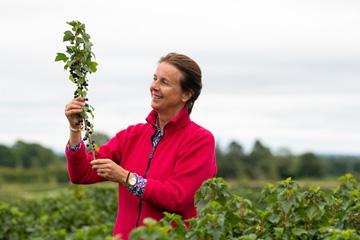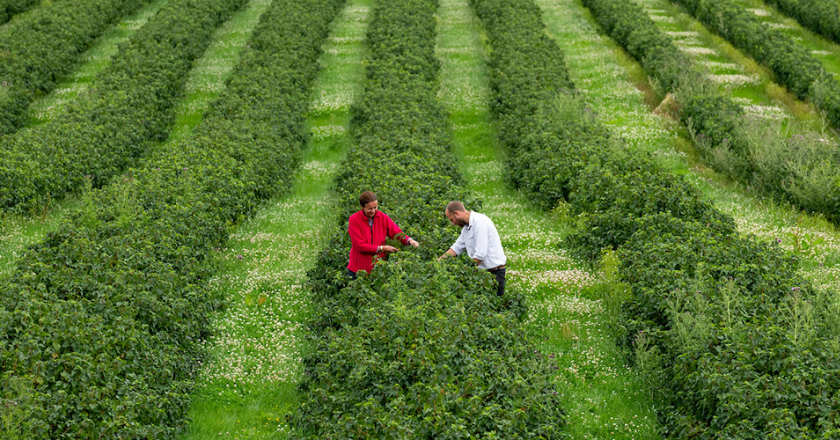Social
Sustainable Procurement
The Suntory Group, which includes Suntory Beverage & Food ("the Company"), is a signatory to the United Nations Global Compact and implements sustainable procurement, together with its business partners, to help build a more sustainable world.
Policies and Our Approach
Basic Policy on Sustainable Procurement
In order to offer customers high-quality products and services, the Suntory Group, which includes the Company, believes it is crucial to promote sustainability throughout its entire supply chain. This means giving due consideration to the environment and society, as well as to safety and reliability.
In 2011, in order to promote sustainability, the Group established the Suntory Group's Basic Policy on Sustainable Procurement, which consists of six main pillars — legal compliance, human rights and labor standards, quality, environment, information security, and harmonious coexistence with society. The policy addresses global issues such as child labor, forced labor, freedom of association and collective bargaining, working hours, and the guarantee of minimum wages. To promote sustainability, the Group is working to raise awareness and deepen understanding among its business partners.
The Group is committed to avoiding situations in which purchasing practices negatively affect the human rights of its suppliers’ workers. To achieve this, the Group agrees in advance with its suppliers on estimated lead times, and shares payment terms in advance. The Group also implements the necessary mechanisms and procedures to ensure that payments are executed on the timeframe agreed with the supplier.
Furthermore, when the Company recognizes that there may be high human rights risk related to an ingredient it wishes to procure, it reviews the related purchasing practices and strives to reduce the risk.
The Suntory Group's Basic Policy on Supply Chain Sustainability (Established 2011)
In order to provide high-quality products and services safely and reliably based on our corporate philosophy of "To Create Harmony with People and Nature" and our Code of Business Ethics, the Suntory Group engages in fair business practices and, in collaboration with supply chain business partners, promotes procurement activities that take social responsibility into consideration, mindful of such issues as human rights, labor standards, and the environment.
We build good partnerships with our business partners and contribute toward realizing a truly affluent and sustainable society.
- Legal Compliance and Respect for International Standards of Conduct
We will promote fair and equitable procurement activities that comply with each country's laws and respect international standards of conduct.
- Consideration for Human Rights, Labor, and Safety and Health
We will promote supply chain CSR initiatives that respect basic human rights and are mindful of labor conditions and safety and health.
- Guaranteeing Quality and Safety
Aligned with the Suntory Group Quality Policy, we will promote supply chain CSR initiatives that seek to guarantee a high level of quality and safety based on the optimal standards for quality, cost, and supply.
- Consideration for the Global Environment
Aligned with the Basic Principles of Suntory Group's Environmental Policy, we will promote procurement activities mindful of the global environment.
- Preservation of Information Security
Confidential information regarding procurement dealings and personal information will be strictly controlled.
- Coexistence with Society
We will promote social contribution initiatives directed toward coexisting within society.
Furthermore, as stated in our Human Rights Policy, we require our suppliers to understand and comply with the ILO Tripartite declaration of principles concerning multinational enterprises and social policy and ILO Declaration on Fundamental Principles and Rights at Work. We expect compliance through the voluntary efforts of our suppliers, even if the ILO principles are not adequately protected by local law.
Supplier Guidelines
The Suntory Group, which includes Suntory Beverage & Food, has established the Suntory Group Supplier Guidelines based on the Basic Policy on Sustainable Procurement to contribute to the realization of a sustainable society while also accelerating sustainable procurement within the Group. These guidelines put in place specific compliance items required in each field from human rights and legal compliance to the environment for suppliers of Suntory in Japan and overseas to confirm the same ethical values are shared between the Suntory Group and its suppliers. Compliance with our human rights commitments is a prerequisite for engaging in a business relationship with suppliers, and we require signing our Code of Conduct/Supplier Guidelines to both new and current suppliers. If a serious law-breaking human rights violation is discovered and it is recognized that the supplier has no intention of improving even after communication, it may lead to the termination of the contract. In order to comply with our Supplier Guidelines, we are promoting joint efforts with suppliers, such as sharing those guidelines at supplier meetings or sharing related information through Sedex.
In addition, in terms of human rights commitments, we request suppliers to cascade down those commitments to their own suppliers.
Suntory Group Supplier Guidelines PDF
Promoting Green Procurement
Green procurement is selecting items and services that consider the environment, such as by not including hazardous substances or efficient use of resources, when selecting ingredients, materials and equipment to purchase.
The Suntory Group, which includes the Company, has established the Suntory Group Green Procurement Standard (revised 2011) based on the Suntory Group’s Basic Policy on Supply Chain Sustainability and seeks to reduce the environmental impact of procurement activities in cooperation with each business partner.
Suntory Group Green Procurement Standard (revised 2011)
- Basic policy
Suntory Group strives to purchase ingredients, materials and services that have the lowest environmental impact as possible for items and services used in the Group to build a sustainable society.
- Prioritized items
-
a)Consider not to use environmentally polluting substances, etc.
-
b)Consider resource- and energy-saving through use of renewable resources, miniaturization, etc.
-
c)Consider resources collection that does not damage the ecosystem
-
d)Long-term use is possible through repair, parts replacement, etc.
-
e)Whether if it is reusable
-
f)Whether if it is design to be recyclable
-
g)Whether if it is easy to dispose or treat
-
h)Whether if it is environmental information about the item is disclosed
-
j)Consider the items is manufactured or sold by business operator that actively engages in environmental preservation such as acquiring ISO 14001
-
Implementation Structure
Implementation Structure for Sustainable Procurement
The Sustainability Committee, an advisory body for the Board of Directors, creates sustainability management strategies, drives related initiatives, and confirms progress on seven themes — water, greenhouse gases, containers and packaging, raw ingredients, health, human rights, and enriching life.
For more information on the Sustainability Committee, see Environmental Management
Our Initiatives
Implementing Human Rights Due Diligence Across the Supply Chain
The Suntory Group has established the Basic Policy on Sustainable Procurement, and in collaboration with business partners, promotes initiatives to respect human rights throughout the supply chain. In 2019, the Suntory Group joined Sedex, the world's largest ethical information sharing platform for suppliers. The Group requests its suppliers to join Sedex and share information, including SAQ* answers, in order to identify any potential issues.
-
*Self-Assessment Questionnaire
Details of Risk Assessment in the Supply Chain
Conducting risk assessment using Sedex tools
The Suntory Group, which includes the Company, conducts a screening based on the Suntory Group's Basic Policy on Supply Chain Sustainability for all new suppliers. In addition, in June 2019 the Group joined Sedex, the largest supplier ethical information sharing platform for corporate ESG data in the world. New and existing suppliers are requested to join Sedex, respond to the SAQ, and share information to identify issues. The SAQ is used to evaluate potential social and environmental risks in the supply chain, focusing on whether appropriate consideration is given to the environment, labor conditions, and safety and health, such as with questions on human rights issues including child labor and forced labor.
As of May 2023, Suntory Beverage & Food has confirmed Sedex membership for around 680 suppliers globally, with over 1,000 manufacturing sites. We will continue requesting all major suppliers to join Sedex. Utilizing the tools provided by Sedex enables a plan-do-check-act (PDCA) cycle and allows us to visualize and address risks related to social and environmental issues. After prioritizing initiatives in each region based on SAQ risk assessments, we formulate and implement action plans.
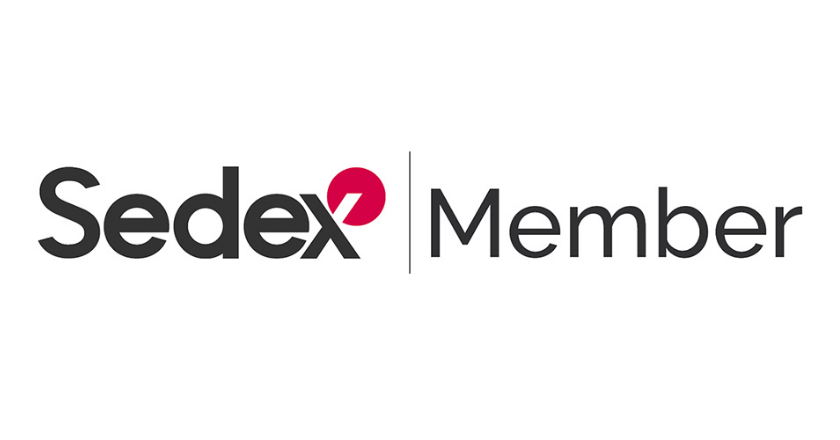
Impact Assessment Status
We identify potential and inherent risks using a risk assessment tool offered by Sedex. Specifically, we evaluate the ability to manage potential and actualized risks of the suppliers with the SAQ. In addition, we also confirm actualized risks based on third-party audit information that can be checked on Sedex.
Potential Risks of Suppliers (As of May 2023)
Suntory Beverage & Food continued with the potential risk assessments through Sedex, obtaining data from a total of 911 manufacturing sites (up to 13 cases compared to November 2022).
| May 2023 | Fluctuation | November 2022 | ||
|---|---|---|---|---|
| Low | 248 | 27% | 3 | 245 |
| Medium | 515 | 57% | 14 | 501 |
| High | 85 | 9% | 9 | 76 |
| Waiting for answer | 63 | 7% | -13 | 76 |
| Total | 911 | 898 | ||
Actualized Risks of Suppliers (As of May 2023)
In the first half of 2022, Suntory Beverage & Food continued checking the non-compliances of our supplier's manufacturing sites obtained through Sedex third party audit data, with a total of 257 important non-compliances visualized (up 45 cases compared to November 2022).
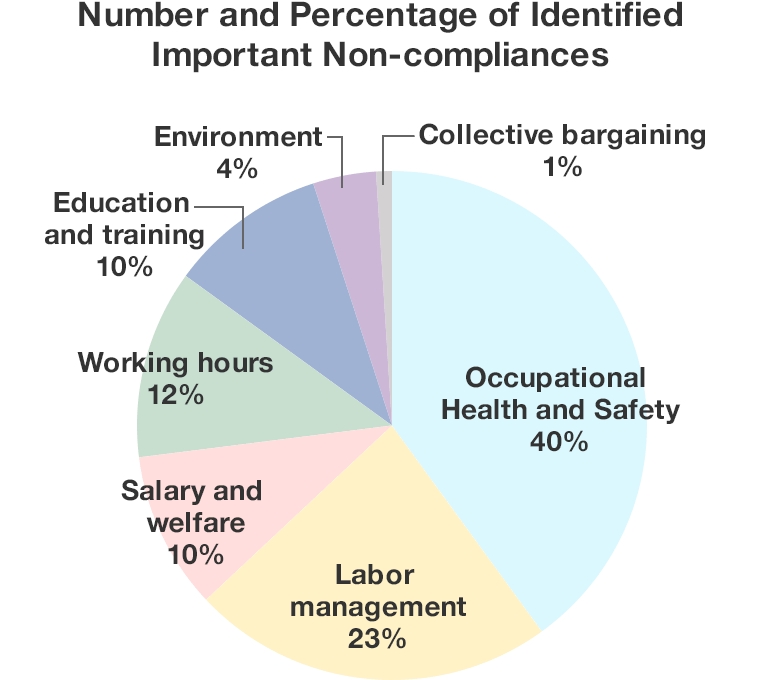
Monitoring through Supplier Assessment Questionnaires
Suntory Beverage & Food also conducts sustainable procurement questionnaires targeting suppliers that have not joined Sedex in order to assess labor-related risks. We examine not only our existing suppliers, but also assess potential new suppliers before we start business relationships. In addition, we share the Suntory Group Supplier Guidelines with our overseas Group companies and verify sustainability initiatives taken by each company via the Global Procurement Conference, in which our overseas Group companies participate. In 2014, we started to visit and interview overseas suppliers to check potential child labor, forced labor, and other human right issues.
For countries with high human rights risks based on human rights risk assessments, see the Assessing Human Rights Risks section on the Human Rights page.
Working to ensure stable procurement of raw materials
With regard to agricultural products and other raw ingredients that are essential to our products, we cooperate with business partners across the supply chain, identify social and environmental issues, and promote sustainability initiatives that enable us to grow together, thereby enriching our communities.
It is predicted that extreme weather, such as drought and flooding, occurring due to the rise in the Earth's average temperature due to climate change will have a major impact on production activities, including causing fluctuations in production volumes and creating the need to move to other locations which offer suitable cultivation. Furthermore, in with the increasing globalization of corporate activities, demand for right responses to social issues is growing, such as consideration for the human rights of people working in the supply chain.
To offer our customers high-quality products and services, Suntory Beverage & Food believes it is crucial to promote sustainability throughout its entire supply chain. This means giving due consideration to the environment and society, as well as to safety and reliability. Based on this belief, we are pursuing a long-term global strategy for optimum procurement of raw materials and striving to practice sustainable procurement.
Overview of Long-term Strategy
The TCFD framework is used to formulate the strategy and we also referred to open scenarios from RCP2.6 (scenarios below 2°C), RCP 8.5 (4°C scenario) from the Intergovernmental Panel on Climate Change (IPCC) and the International Energy Agency (IEA) for identifying risks and opportunities. The documents, information, and data referred to in this exercise are current as of the time of the review, and the analyses and calculations based on them are subject to uncertainty.
By focusing on our policies such as Environmental Vision toward 2050 and The Suntory Group's Basic Policy on Supply Chain Sustainability in addition to long-term trends specific to raw ingredients, we aim to create a vision of what we would like raw ingredient procurement to be in the future, find countermeasures based on the gaps between the current situation and be ready to respond to a wider range of social and environmental sustainability issues.
Activity Overview
The strategy development is based on the following steps:
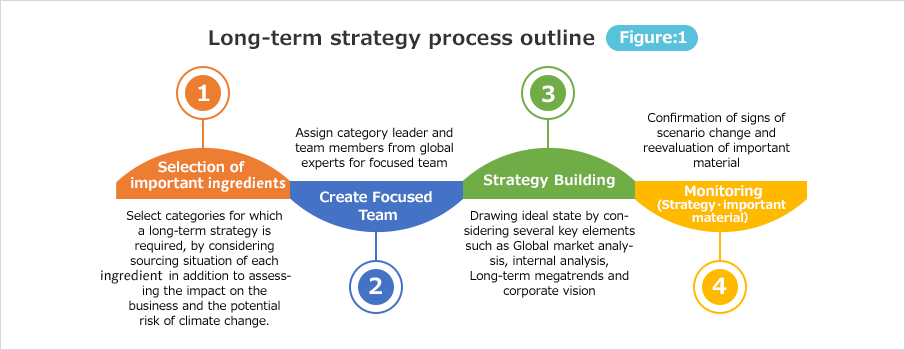
1. Selection of important raw ingredients
- Identify materials that are particularly important to the business activities of the Suntory Group, which includes the Company.
- Conduct risk assessment of materials handled in the Group’s business.
- Based on the results of the assessments, the materials category for which long-term strategies are to be formulated are selected through consultations with related parties.
<Risk assessment process>
-
(1)Extraction of important raw materials
The impact is defined as the loss of product sales that the business would suffer if there were a problem with the supply of raw materials, and raw materials with a high impact were extracted as priority raw material, including agricultural materials such as coffee beans, the material that undergo processing such as sugar, and vitamin C. -
(2)Risk Assessment
To evaluate the possibility of problems in the supply of the extracted key raw materials – the effects of climate change on yield and suitable areas for cultivation, which are considered to have the greatest impact on future supply, were studied and evaluated from the research and statistical perspectives. One of the results is shown in Figure 2. For raw materials that undergo a certain amount of processing, the risk assessment considers the impact of climate change on the production area of the base material and the ratio of raw materials used in the process. (Example: for sugar, see the results of climate change impact assessment for sugar cane and sugar beet)
Based on the above approach, we found that the yields of agricultural materials such as corn, and coffee beans will be Significantly impacted in several production areas. On the other hand, for green tea leaves procured in Japan, it was found that the suitable growing area will increase.
Figure 2: Yield Impact Survey Results (2023)
4°C temperature increases scenario in 2050: Study of the effects of yield and suitable land on major raw materials and production area
-/+ Impact
Below 10%
More than 10% - below 50%
More than 50%
down1/up1
down2/up2
down3/up3
| Business Sector | Material | North America |
Latin America |
Asia | Europe/ Africa |
Oceania |
|---|---|---|---|---|---|---|
| Beverage * | Corn | USAYield: down1 | BrazilYield: down1 | China Yield: down2 | ||
| Beverage * | Sugarcane | BrazilYield: up3 | ThailandYield: up2 | AustraliaYield: up2 | ||
| Beverage | Coffee beans | Brazil Yield: down2 ColombiaYield: down2 GuatemalaYield: down3 |
||||
| Beverage * | Raw Milk | JapanYield: down1-down3 | AustraliaYield: down1-down3 New ZealandYield: down1-down3 |
|||
| Beverage | Green Tea Leaves | Japan Suitable Land: up1 |
-
*Include origin of processed material
-
(3)Formulation of activity plan
Based on the results of the survey, we consulted with the relevant departments and selected the following raw ingredient commodities, for which we are promoting activities.
2021: Coffee, Oolong Tea, and Corn
2022: Barley, Sugar, High Fructose Corn Syrup (HFCS), Vitamin C and Citric Acid
2024: Citrus, Black Tea, DairyNote)
Coffee refers to the results of a climate change impact study on coffee beans. Similarly, sugar refers sugarcane etc. HFCS, vitamin C and citric acid are modeled by corn. Dairy is modeled by raw milk.
2. Creation of task forces
- A task force of experts within the group from various departments such as research, development, procurement, and quality assurance is formed to work on the selected materials.
3. Building strategy
- Analysis of market, company, and trends by task force
- Analysis of future world scenarios and description of the ideal state within those scenarios
- Design of activities by backcasting from the future world back to the present to set issues
4. Strategy monitoring
- Monitoring of signs of scenario change and strategy revision based on prior assumption of change
- Revise road map of strategy building by reevaluating materials risk
Strategy Execution
The long-term strategy formulated by the task force is discussed regularly by the Sustainability Committee, an advisory body to the Board of Directors, and its activities are promoted.
Progress of Activity in 2023
1. Strategic Implementation Based on the Roadmap Formulated in 2022
The focused task force set its time axis to 2050 with respect to the relevant raw ingredient categories, and considered publicly available scenarios from the IPCC, IEA, and other organizations. It then considered possible business impacts as of 2050 from an environmental perspective, including the impact of climate change, as well as from a social perspective, including human rights. The task force also considered the best path to the desired state of raw ingredient procurement, based on trend analysis and company goals.
As part of the task force discussions, the business impact of future climate change was reassessed by utilizing S&P Global’s Climanomics platform.*
Last year, the focused team calculated monetary impacts for three key raw ingredients (coffee, oolong tea, and corn). This year, after further discussion, sugarcane, and sugar beets were added to the analysis, and monetary impacts for a total of six key raw ingredients were calculated.
As shown in Table 3, based on the task force’s December 2023 analysis, the total business impact of the 4°C scenario as of 2050 is projected to be a positive ¥5.1 billion. Prices of coffee, oolong tea, and corn are projected to rise due to falling output, raising procurement costs. At the same time, sugarcane and sugar beet prices are projected to decrease on higher output, resulting in a positive business impact.
-
*Climanomics covers recommended disclosure items in accordance with the TCFD framework, based on comprehensive scientific data. By entering company information (for raw ingredients, purchase amounts) into the service, one can determine at a glance which company assets and crop-growing areas are likely to be impacted by climate change at any time up to 2100, and which areas are potentially at risk.
(Figure.3) Scenario Impact on business 4°C Scenario in 2050:
Total impact: 5.1 Billion
| Coffee | ¥ 8.0 Billion |
|---|---|
| Oolong | ¥ 0.5 Billion |
| Corn | ¥ 1.0 Billion |
| Sugarcane | ¥ -4.0 Billion |
| Sugar Beets | ¥ -0.4 Billion |
-
*Currency exchange rate 1USD=145 JPY
2. Example of Activities Derived from Specific Strategies
-
(1)
We recognized the need to further improve the sustainability of agricultural raw ingredients and joined the Sustainable Agriculture Initiative (SAI) platform, an international organization established in 2002 to promote sustainable agriculture as the Suntory Group. This is the first time for a Japanese company to participate in the platform.
For more information, see Suntory Group Joins the Sustainable Agriculture Initiative (SAI) Platform
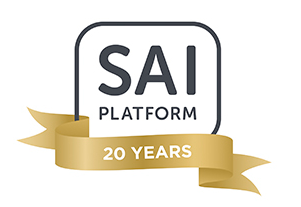
-
(2)Start Pilot of Regenerative Agriculture
We have started a pilot program for regenerative agriculture with blackcurrant farmers in the UK. Regenerative agriculture is expected to have a positive effect on climate change mitigation and adaptation by reducing GHG emissions through reduced use of chemical fertilizers and pesticides, and by regenerating biodiversity in the soil, making the soil more fertile and enabling more effective use of water. -
(3)
Sustainable Sugar Procurement Initiatives
Based on the sugar strategy, in August 2023 we became the first Japanese corporation to join VIVE, an international organization supporting sustainable procurement of agricultural products, mainly sugarcane.
Next Step
Based on activity plans for strategy creation and ongoing dialogue with business units, we will keep forming task forces for important raw materials, build long-term strategies, and share strategies formulated by the Suntory Group throughout the Company.
In addition, based on the formulated strategy, we will consider and proceed with initiatives for regenerative agriculture, which is expected to have mitigation and adaptation effects, for materials with high climate change risk in the future or high GHG emissions.
In strategy monitoring, we periodically forecast possible branch points in the scenario, and check if there have been events such as the success of technological innovations necessary to achieve the desired goals. This will enable us to capture important changes as much as possible in advance and revise the strategy to incorporate them.
We will also revise the roadmap for strategy building by regularly re-evaluating material risks.
Collaboration with Suppliers
Improving Cooperation with Business Partners
The Suntory Group, which includes the Company, strives to promote sustainable procurement together with all of its business partners in the supply chain. The Group is promoting better awareness and support so that the necessity of sustainability initiatives is understood, by providing education for company representatives and policy briefings and questionnaires for ingredient suppliers, manufacturing outsourcers, logistic affiliates, and other primary business partners. In addition, the Suntory Group participates in the Consumer Goods Forum Japan,* which promotes distribution networks of consumer goods across the industry, to reduce the environmental impact of the Suntory supply chain.
-
*The Consumer Goods Forum Japan is an organization primarily made up of companies in the consumer goods distribution industry that engages in cooperative manufacturing, distribution and sales efforts to address common challenges in non-competitive industries in Japan.
Specific Examples of Activities to Support Sustainable Agriculture
Initiatives in Collaboration with Green Tea Production Area
In order to promote sustainable procurement of the tea leaves used for green tea beverages, the Suntory Group, which includes the Company, has launched a long-term initiative in collaboration with tea production areas. Collaborating with the Kuma Regional Agricultural Cooperative (JA Kuma), the Group has succeeded in reducing GHG emissions by more than 30%*compared to the general production method by introducing an environmentally friendly process in the tea leaf production process at JA Kuma. In addition to pursuing high-quality tea production, the Group hopes to contribute to the sustainability of tea production in the region and the training of successors in tea farming.
-
*Emissions per unit production weight in the production of green tea raw ingredients in the process from leaves to Aracha tea
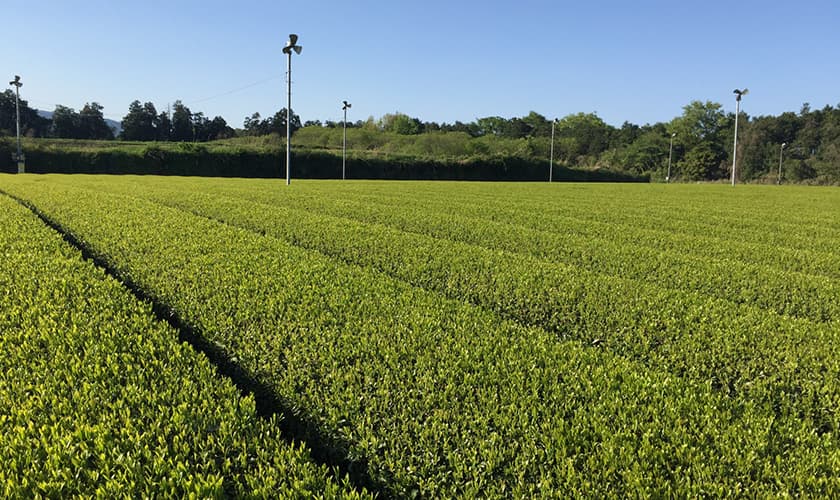
Supporting Sustainable Agriculture of Blackcurrant Farmers
Suntory Beverage & Food Great Britain and Ireland (SBF GB&I) manufactures and sells Ribena, a soft drink loved by many in Europe and other regions. 90% of the blackcurrants grown in the UK are used by this iconic juice drink brand. SBF GB&I began supporting sustainable agriculture of blackcurrant farmers in UK from 2004. SBF GB&I employs agronomists, that directly advice farmers and design biodiversity plans according to the biological habitat of each farm and surrounding area to protect the ecosystem of rivers and wetlands. We also conduct research on new species of blackcurrant that are resilient to climate change. In July 2020, a new variety of blackcurrant that is more resilient to climate change named Ben Lawers blackcurrant was harvested. This was a result of a long-term joint research with the James Hutton Institute, a research institute for agriculture.
Promoting Sustainable Procurement in Upstream Supply Chain for Coffee
Guatemala
The Suntory Group is supporting Guatemala coffee export company Unex on promoting their program “farmer aid,” aimed at helping coffee farmers to tackle different environmental and social challenges and strengthen the sustainability of the coffee beans they produce. The famer aid program is based on 4 pillars: health, education, sustainability, climate change. In 2022, The Suntory group financially supported this program in 2 ways:

(1) Child care center in Alotenango
This child care center is open during school holidays (from October to January) and is used as a free education and recreation place for coffee farmer’s children, and also serves the purpose of minimizing the risk of child labor by taking care of the children during harvesting season. The center also provides medical services to both children and their parents.
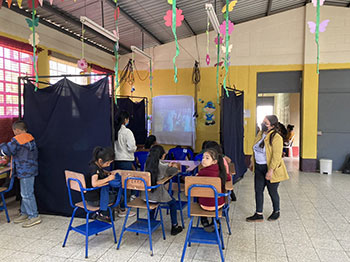
(2) Coffee Farmer Training in Santa Barbara
We are supporting the current sustainable practices of the farm via training providing which benefits small producers to strengthen their coffee production and improve their families livelihood. We also empower women through farming practice trainings in order to contribute to a better livelihood for them and their families. Through the farmer aid sponsorship, we are being able to create positive impact on approximately 300 families, including children, in Guatemala.
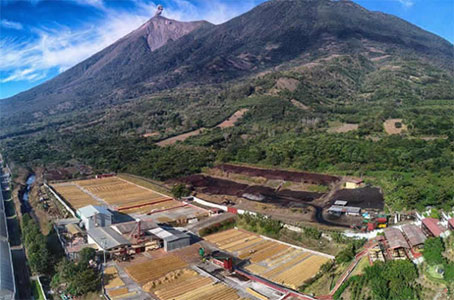
Brazil
In order to expand its human rights diligence efforts upstream in the supply chain, the Suntory Group, which includes Suntory Beverage & Food, is planning to formalize a partnership with Itochu and its local partner in Brazil, Sucafina, to start a pilot program to assess and support coffee farmers in the Cerrado region of Brazil.
The pilot leverages Sucafina’s responsible sourcing program “IMPACT,” and its founded on 5 main pillars: carbon emissions, deforestation, human rights, living income, and regenerative agriculture. IMPACT standard verification ensures compliance with 80 social, environmental, and economic standards modelled on the Global Coffee Platform’s Sustainability Reference Code, with independent audits done every 3 years. Regarding human rights, IMPACT has key indicators such as health and wellbeing, forced labor, child labor, freedom of association, grievance, working hours, discrimination and land rights. Going forward, the Group will monitor and improve the working conditions of the targeted farms during the initial three years of this pilot.
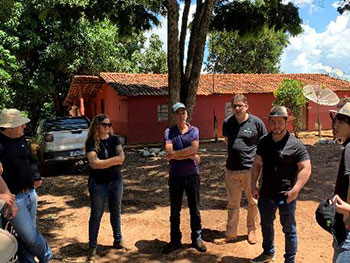
Engagement with Local Coffee Farm to Improve Community Resilience
The Suntory Group, which includes the Company, procures a portion of its coffee beans from the Fazenda Bau farm, which is a specialty coffee farm in Minas Gerais, Brazil, seeking the highest quality and sustainable supply of coffee beans. Fazenda Bau has acquired international sustainable certifications, and their thorough quality management and workplace environment are highly praised.
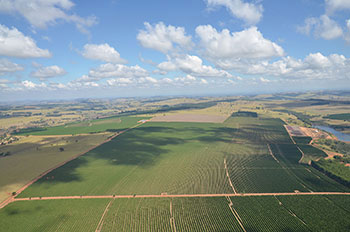
Fazenda Bau has been engaging in a wide range of activities to promote sustainability, turning their attention to labor practices and the labor environment, conducting efforts such as courses on the health and safety of employees, as well as courses about motivation and human relationships in the workplace, among other initiatives. Environmental conservation activities such as separating trash and comprehensive management of the water intake as well as tree planting initiatives show their awareness regarding their impact on the environment. In addition, the Fazenda Bau have been engaging in a support project at a neighboring school since 2011 with the purpose of contributing to the local community.
Supplier Engagement and Educational Activities
As a member of the Suntory Group, Suntory Beverage & Food strives to promote sustainable procurement together with all of its business partners in the supply chain.
In addition to providing education to our employees, we hold annual policy briefings for our major business partners, such as raw material suppliers, contract manufacturers, and logistics partners. We are promoting better awareness and support for sustainability initiatives within each company or in cooperation with the Suntory Group by introducing Suntory Group initiatives and providing questionnaires.
Collaboration with Logistics Partners
As of the end of 2022, the Safety Committee, launched in collaboration with the Suntory Group’s logistics partners, had 325 members from 76 companies, all promoting initiatives to ensure safety, environmental friendliness, and risk management. The committee holds an annual Safety Promotion conference attended by managers from 150 sites nationwide, including distribution centers, warehouses of logistics partners, and transportation and delivery operations. At the conference, the committee holds study sessions and contests, shares best practices, and presents awards to outstanding drivers and logistics bases, encouraging and strengthening safety initiatives of each company. To support safety management levels at its logistics subcontractors and improve them continuously, the Suntory Group, which includes Suntory Beverage & Food, employs Top Safety Site certification, an initiative of the Ministry of Land, Infrastructure, Transport and Tourism of Japan. As of the end of 2022, 635 of the Suntory Group’s 1,047 logistics partners had already acquired certification, and 98 were scheduled to acquire certification in 2023, bringing the total certification rate to 70%. In 2008, the scope of certification was expanded from direct subcontractors to secondary subcontractors, to further strengthen safety management systems for transportation and delivery.
Industry Collaboration Initiatives
In addition, the Suntory Group, which includes the Company, participates in the Consumer Goods Forum Japan,* which promotes distribution networks of consumer goods across the industry, to reduce the environmental impact of the Suntory supply chain.
-
*The Consumer Goods Forum Japan is an organization primarily made up of companies in the consumer goods distribution industry that engages in cooperative manufacturing, distribution and sales efforts to address common challenges in non-competitive industries in Japan.
Rigorously Engaging in Fair and Equitable Business Practices with Suppliers
In its dealings with suppliers, the Suntory Group, which includes the Company, provides each company with an opportunity for equitable competition in keeping with its Purchasing Control Regulations and Business Partner Selection Standards, based on the Suntory Group’s Basic Policy on Supply Chain Sustainability. Additionally, when the Group selects new suppliers or determines whether to continue business with its existing business partners, it fairly evaluates the quality and supply capabilities of the products and services, financial status, assured safety, environmental conservation, and social contribution of each company.
The Group and its suppliers strive to be dependable partners for one another, working together to provide products and services that delight customers.
Suntory Group Standards for Business Conduct
Bookkeeping System Compliant with the Subcontract Act
The Suntory Group’s bookkeeping system is compliant with the Act against Delay in Payment of Subcontract Proceeds, etc. to Subcontractors (Subcontract Act), enforced by the government of Japan. The system prevents troubles such as payment delay by displaying warnings on the administrator screen when a payment process has not been carried out according to the payment and other conditions entered at time raw materials or packaging were ordered. In 2020, there were no transactions of raw materials or packaging that violated the Subcontract Act.*
-
*The number of business partners to which the Subcontract Act applies is 43 for the Purchasing Department (about 12% of total transaction volume) as of December 2020 and 116 companies for the Packaging Material Development Department (about 11% of total transaction volume) as of December 2020.
